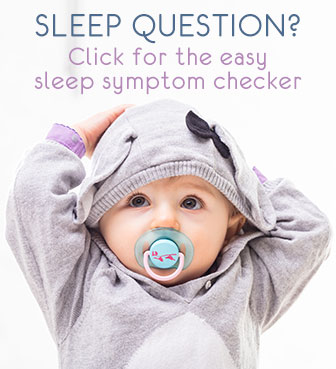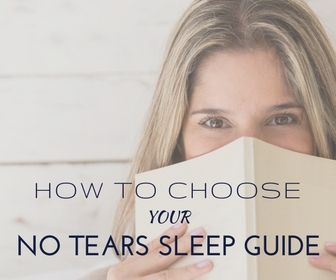Sleeping Well in Spite of Baby Teething
Author Name: Heidi Holvoet, PhD
Medical fact-check: Dr Leah Alexander, M.D., F.A.A.P.
Can teething disrupt your baby's sleep? It sure can! Luckily, when you recognize teething signs early on and provide effective remedies you'll prevent discomfort and troubled naps and nighttime sleep.
Teething in babies is both under-estimated and over-estimated as a cause of poor sleep:
- Under-estimated because teething causes more than just sore gums and rosy cheeks. Generally feeling poorly, sometimes feverish and almost always a reduced appetite, add to the sleep difficulties
- Over-estimated because some dismiss all sleep problems as "oh it's only teething". But that's not right either. Teething isn't the fix-all cause to solve all sleep problems as it's usually not the only trigger of poor sleep quality.
That said, if left untreated, teething can definitely contribute to not having your baby sleep through the night.
And for many babies it causes not being able to fall asleep, having trouble staying asleep or sleep unless held.

photo courtesy of crazeeloki
Why your teething baby won't sleep well
1. Teething is painful
Some babies and their parents hardly realize their teeth are cutting through.
They just have rosy cheeks, or red cheeks, dribble a bit for a while and then suddenly: your baby has a new tooth to show off!
For many others, cutting teeth is simply painful. Apart from straight pain, the constant pressure on your baby's gums can make them restless and irritated.
2. Teething makes your baby feel unwell
Your baby can also feel unwell generally, feel sleepy but not necessarily take naps or sleep well, develop a fever or an irritating rash.
Review the complete teething signs checklist if you're unsure what's happening.
3. Teething causes loss of appetite (which leads to hunger at night)
Because of the discomfort in their mouth, many babies lose their appetite too.
To be precise, they're still hungry as usual, but because feeding is painful - the contact with the (bottle) nipple or the food on the sore gums - they just eat less which makes them seem to have reduced appetite.
So your baby will be hungry yet not feel great about eating, and can't take large meals.
Most babies then play catch up at night waking for more feeds than you'd gotten used to.
And all of this answers the question why your teething baby won't sleep well: directly and indirectly, it's just physically difficult for your baby to get a good night's sleep.
The discomfort often plays up more than during the day. Because in the daytime, there are more distractions and parental comfort and soothing nearby.

How teething affects your baby's sleep
Thanks to teething:
- a baby who has been sleeping through the night for a while can suddenly start waking up frequently again. This can typically be night waking every hour, crying or screaming.
This painful waking can have a pattern of occurring for a few consecutive nights, alternating with a few nights of better sleep until the painful tooth cuts - a baby who easily self-soothed to sleep in the cot, or co-sleeping, at night or for naps, can suddenly take hours to wind down and finally fall asleep. And possibly your teething baby won't sleep unless held
- a finally found sleep schedulecan get all mixed up again. Don't despair, not all your previous efforts are lost, and you can keep your nights decent with these 3 must-do tips:
How to help your teething baby sleep
1. Recognize the early teething signs
Rosy cheeks or bright red cheeks are typical with teething, and so are dribbling and chewing.
Some symptoms are less obvious so keep in mind both when baby teething starts and signs of teething to look out for.
2. Keep up the strong sleep hygiene foundations
Keep your usual bedtime routine and sleep schedule as much as possible. If your teething baby won't sleep unless held, review my no-tears self-soothing process with care.
Do this with extra care for your baby's needs right now:
- your baby may need an extra feed - day or night - especially when feeds are smaller because of reduced appetite
- if you breastfeed, extra (small) feeds are great to help soothe the pain. This is also ideal for teething pains at night
- your baby may need extra cuddling and comforting to help with settling so don't hold back 💛
At the same time try to strike a healthy balance:
remain determined and, when you've looked after your baby's pain and discomfort as much as you could, don't be afraid to stick to the feed and sleep schedule and bedtime routine you had before
The regularity and sleep hygiene support your baby's natural sleep patterns, and effectively help your baby sleep more. This will help overcome a large part of the discomfort and trouble sleeping
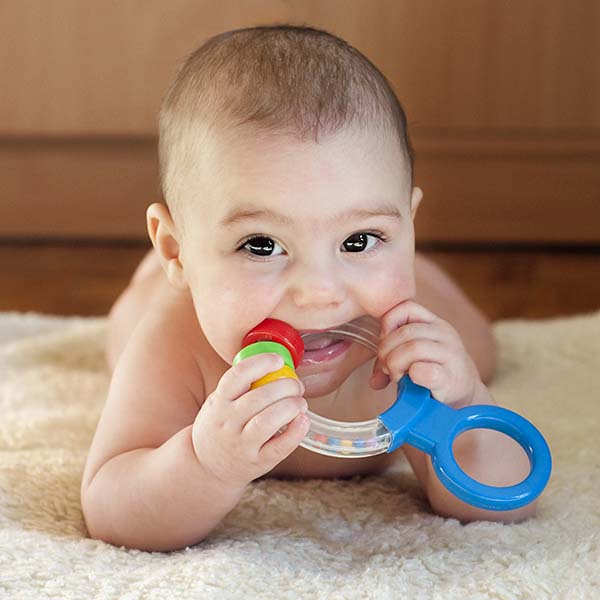
3. Apply effective teething remedies
For most babies the simple home remedies for teething I recommend are enough to soothe your baby's pain.
Gum massage, cold teething rings, cold foods when appropriate can all help really well.
Extra tip: the gentle remedies only work well though if you keep doing them consistently for a while. For each of the remedies, shorter periods / sessions, a few times a day is ideal.
If your baby is truly unwell or in a lot of pain, some teething gel, medicine or other mild medical remedies can be of great help. Consult your doctor of pharmacist for advice.
Wrapping up: baby teething and sleep
With all these basics and sleep tips above, you should be able to help your baby sleep at night and naps optimally, in spite of teething.
However, some babies' teething troubles seem to go on forever. One painful tooth after the other make many parents wonder if they wanted those teeth after all :/ I know it's difficult.
Please take courage, keep in mind the sleep tips and advice above. Review the teething remedies and know that they help. You'll be rewarded one day soon and finally be proud of those teeth.
I know you're also tired as a parent and sleep deprivation is rough. If naps and nighttime sleep continue to be difficult, don't hesitate to contact us: the team and I are always here for you!
Article Author: Heidi Holvoet, PhD - Founder, senior sleep consultant

Heidi Holvoet, PhD, is the founder of the Baby Sleep Advice website and movement, an award-winning author, baby & toddler sleep consultant with 17+ years experience as well as a certified lactation counselor.
Over the years, Heidi has received several awards inluding a Mom's Choice Award (MCA) and National Parenting Awards (NAPPA) for her Baby Sleep Advice website, programs and books. Also, Baby Sleep Advice was awarded "Most Trusted Infant's Sleep Solutions Company 2023" in the Benelux Enterprise Awards 2023.
Heidi continually conducts personal research and participates in continued education and in that way stays up to date with current scientific and pyschosocial infant care.
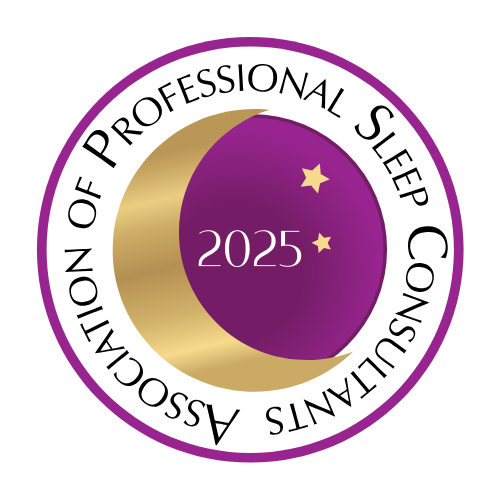
She is also a member of the Association of Professional Sleep Consultants of which she was one of the earliest contributors. She obtained her PhD degree in physics at the University of Ghent in Belgium.
Heidi is passionate about helping babies and their parents sleep more and better, with her trademark holistic and truly-no-tears approach that has been proven and praised time and again by parents worldwide to be effective and truly no-tears. Respect for you as a parent and your baby, is at the heart of Heidi's warm and kind support. Her approach always keeps in mind a baby's needs and abilities at any given age, is based on pediatric science and the most up to date knowledge in infant care and sleep science.
As well as the award-winning baby sleep programs, Heidi offers popular 1:1 consults and easy-access 30-minute SOS Sleep sessions.

Baby waking every hour?
by Heidi Holvoet, PhD

A Bedtime Routine: Settling To Sleep Like A Charm
by Heidi Holvoet, PhD
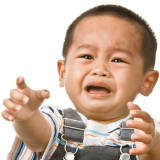
Separation Anxiety
by Heidi Holvoet, PhD
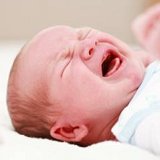
Colic
by Heidi Holvoet, PhD

Why does my baby wake up every hour?
by Heidi Holvoet, PhD

